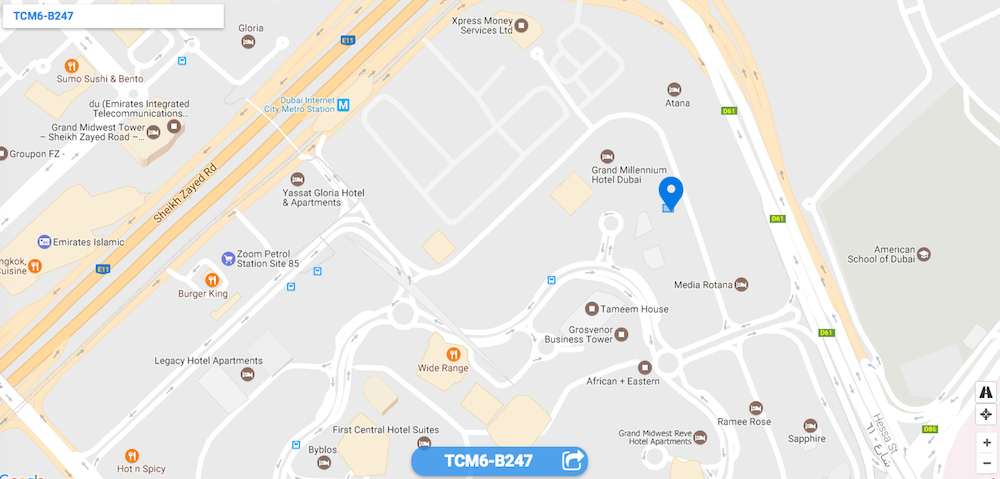Going postal in Dubai, finally

When Mohamed Al Araimi and Bello Abubakar built a grocery delivery startup they weren’t expecting it to create the backdrop for their second venture.
While running Shoponclick.me, which operates in Dubai and initially operated in Muscat, they constantly found it difficult to locate customers.
It is a common issue in the region, not just Dubai, people looking for any kind of delivery to their home or workplace, are used to obstacles. Often they have to give instructions that are more centered on landmarks and corner shops, rather than street names or postal codes. “We realised this wasn’t viable for us,” said Omani expat CEO Al Araimi. “Every time, we had to ask people for their coordinates on Whatsapp.”
The rapid growth of UAE cities like Dubai have undergone in the last few decades, has been constant and appears far from finished. One of the caveats of this growth though is that the mapping system for Dubai neighborhoods is not 100 percent complete.
Wenaak.com (meaning ‘where are you?’ in Arabic) is how Al Araimi and Abubakar solved their problem for Shop On Click’s customers.
It’s a free service for consumers. It is businesses such as ecommerce sites or logistics companies that will pay. And the more they use it the cheaper it will become.
Still in beta, Wenaak was inspired, not only by the difficulties experienced with Shop On Click, but also by living in the UK, where they had enjoyed the simplicity of the mapping system.
“What appeals to us about Wenaak is the nostalgia of living in the UK: when we heard the London postal code, for example, we could instantly place it on a mental map and have a general idea of where it should be. The codes were easy to remember and practical when it came to mail or giving directions to visitors from out of town,” said Abubakar.
So they decided to create a postcode. Similar to the UK model, there are two parts with four digits on each side. For example, Reading would be RG1 followed by other letters and numbers, while North West London would be NW1, again followed by specific letters and numbers.
“If you go through the science of the human brain, you’re more likely to remember patterns and words than numbers,” said Al Araimi.
He added use cases such as saving time by filling out the short Wenaak postcode instead of a lengthy address when purchasing products on an ecommerce website.
Abubakar shared details on how the Wenaak mapping system came about for countries such as the UAE. They have created the codes by dividing countries into 15 by 15 meter grids and assigned unique alpha-numeric codes to each grid. The code itself has a 4 by 4 structure: the first four being the neighborhood and the second four being a very specific location. “The user can then take the code and share it with their friends to give their precise location.”

They have provided their API for testing to popular GCC ecommerce sites Namshi and Wadi - both are currently testing the feasibility of Wenaak technology while considering rolling it out to the public this year - and discussing collaboration opportunities with carrier companies to simplify deliveries. They hope to work with GCC governments as well as expand to Africa and Southeast Asia.
According to Abubakar the implementation of the latter will be cost-effective. “It’s going to be cloud-based, so this will reduce costs massively. You don’t have to go to each building to assign a code: it will all be done online.”
The team also want to extend their service to the emergency services. “With our current technology, we’ll be able to provide an offline solution. So if you’re somewhere in Dubai in the desert, we want this service to offer an emergency [element] for people to contact Dubai Police,” said Abubakar.
Staying connected
Al Araimi and Abubakar are of course not reinventing the wheel. Startups have already been solving this issue in other countries around the world: think Zippr in India and What3words in the UK.
For those who want to explore the UAE desert in vehicles without getting lost, especially with spotty network coverage, a solution already exists for real-time tracking of moving vehicles.
Trkr.net is a mobile app for smartphones that lets users organize and track groups of cars whenever they go off-road. Launched in 2015 by Omar Diab and Sharif Aboulnaga, two engineers with Egyptian roots who are based in the UAE and US, the app is still a work in progress and is currently undergoing some updates in order to make improvements.
When it comes to GPS for indoors - think Dubai’s giant malls - the UK-based Pointr has recently expanded to MENAT (Istanbul and Dubai) and offers extremely precise indoor positioning. What’s distinct about its technology is that can distinguish between multiple levels of a building and point out whether taking the stairs or an elevator is the best option to maneuver between them. Its signature blue dot that points out the positioning of the user, visible in the video below, is very similar to maps featured on videogames: it is actually reminiscent of the legendary Pac-Man.
For Abubakar, providing Weenak is a means to an end that he and Al Araimi feel is important: making life easier for society. “You’ve got a limited amount of time on this planet. At the end of it, if you haven’t improved things around you or the lives of people around you, life is wasted.”
Feature image via Wamda.


